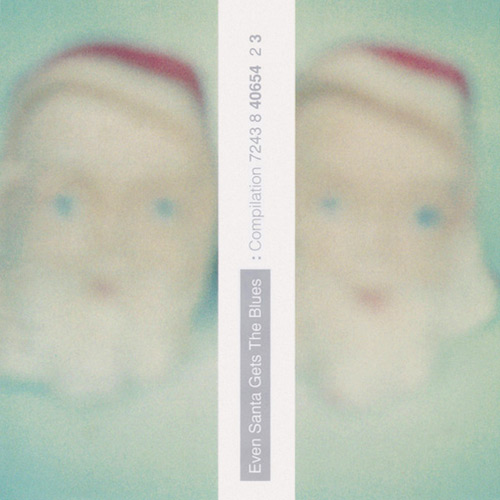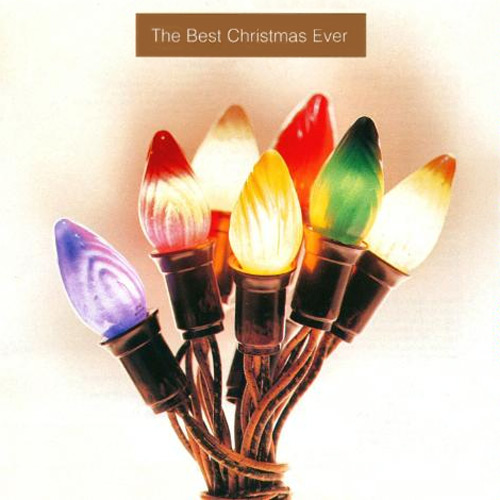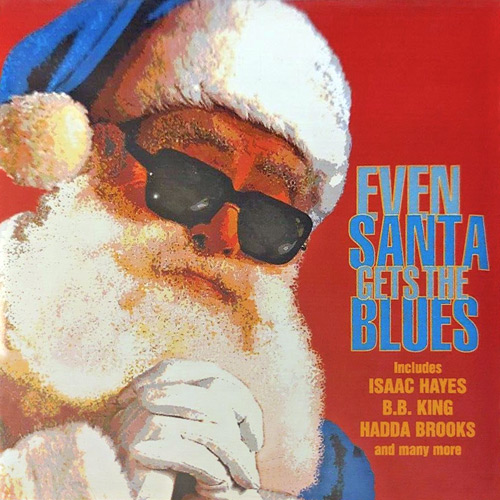
Even Santa Gets The Blues
various artists
Support www.hipchristmas.com! Shop at Amazon, Apple Music, and more...
 This is a tale of two fine Christmas collections released in the mid-90's as the "CD era" wound down. In the coming years, the compact disc would grow less and less relevant as a medium. In the new world of digital downloads and, later, streaming, the CD compilation would become a curiosity, unnecessary for all but the most obsessed collectors - like you and me. But, these two albums were released in the days before Napster, iTunes, and Spotify - that is, when expert curation still held value. The first, Even Santa Gets The Blues (1995), released by Pointblank Records, a Virgin-distributed imprint, combined six songs by blues artists from the Pointblank roster with four vintage blues gems. The second, The
Best Christmas Ever (1996), was released by Virgin Records proper, and it combined six of those songs with eleven catalog tracks - some far afield from the blues.
This is a tale of two fine Christmas collections released in the mid-90's as the "CD era" wound down. In the coming years, the compact disc would grow less and less relevant as a medium. In the new world of digital downloads and, later, streaming, the CD compilation would become a curiosity, unnecessary for all but the most obsessed collectors - like you and me. But, these two albums were released in the days before Napster, iTunes, and Spotify - that is, when expert curation still held value. The first, Even Santa Gets The Blues (1995), released by Pointblank Records, a Virgin-distributed imprint, combined six songs by blues artists from the Pointblank roster with four vintage blues gems. The second, The
Best Christmas Ever (1996), was released by Virgin Records proper, and it combined six of those songs with eleven catalog tracks - some far afield from the blues.
Even Santa Gets The Blues
Pointblank Records was founded in 1988 by Virgin executive and producer John Wooler to release blues and soul music. Most of the label's releases were new recordings by well-established elder statesmen like John Lee Hooker, Van Morrison, Dr. John, Solomon Burke, and Albert King. But, the label also dabbled in reissues - most from masters owned by EMI, Virgin's parent company. Even Santa Gets The Blues was a hybrid of the two. Five songs - three by pianist and singer Hadda Brooks and two by soul man Isaac Hayes - made their debut on the album. One, Johnny Winters' cover of Charles Brown's "Please Come Home For Christmas," had been released on his 1992 Pointblank album Hey, Where's Your Brother. The remaining four were licensed from the catalogs of two independent Los Angeles blues labels - Kent and Modern - that Virgin had already been exploring on reissues like Brooks' That's My Desire: The Modern Recordings (1994).
Taken as a whole, Even Santa Gets The Blues is a satisfying, slightly schizophrenic blues experience. Everything herein is fine, but jumping between styles and eras can be discombobulating. And, at 10 tracks, it's too brief, running less than 40 minutes on media that held close to 80. Even so, all the catalog tracks are rarely seen on Christmas anthologies, and the new recordings are fun - if mostly less than essential.
 Foremost among the former is B.B. King's incendiary waxing of "Christmas Celebration," recorded in 1960 but not released until (probably) 1962. Originally recorded in 1951 by Jesse Thomas as a laconic shuffle, the song is transformed by King into a strident, full-throated, brassy, uptown juggernaut, full of the manly bravado and stinging, single-string guitar leads that have earned him such respect. Simply put, I consider it one of the greatest Christmas songs of all time. Then, there's Jesse Belvin's impossibly smooth "I Want You With Me For Christmas" (1956), Charles Brown's rare 1968 recording of his timeless "Merry Christmas Baby," and Lowell Fulson's "I Wanna Spend Christmas With You" (1967), which is an updated version of his own classic, "Lonesome Christmas" (1950).
Foremost among the former is B.B. King's incendiary waxing of "Christmas Celebration," recorded in 1960 but not released until (probably) 1962. Originally recorded in 1951 by Jesse Thomas as a laconic shuffle, the song is transformed by King into a strident, full-throated, brassy, uptown juggernaut, full of the manly bravado and stinging, single-string guitar leads that have earned him such respect. Simply put, I consider it one of the greatest Christmas songs of all time. Then, there's Jesse Belvin's impossibly smooth "I Want You With Me For Christmas" (1956), Charles Brown's rare 1968 recording of his timeless "Merry Christmas Baby," and Lowell Fulson's "I Wanna Spend Christmas With You" (1967), which is an updated version of his own classic, "Lonesome Christmas" (1950).
The new recordings on Even Santa Gets The Blues are less impressive, if only in comparison to those four classics, and I'd argue that the biggest news is Hadda Brooks' comeback. In the 40's and 50's, Brooks was both a hyperkinetic boogie woogie pianist and, somewhat incongruously, a sultry torch singer. It was in the latter mode that she scored three Top 10 R&B hits for Modern Records, including the title track to Virgin's aforementioned That's My Desire compilation. Later, Pointblank compiled the more wide-ranging I've Got News For You (1997), while Sony released Jump Back Honey: The Complete Okeh Sessions (1997) covering her early 50's tenure for the Chicago-based label.
But, after the early 1960's, Hadda Brooks didn't record much for three decades - though she continued to perform, often overseas, before settling in as a fixture on the West Coast club scene. She rebooted her recording career in the 1990's starting with Anytime, Anyplace, Anywhere (DRG, 1994), and her contributions to Even Santa Gets The Blues were her first studio efforts after signing to Pointblank. They include two seasonal favorites, "I'll Be Home For Christmas" and "White Christmas," and - most notably - the brooding, autobiographical original, "L.A. Christmas Blue." Ultimately, Hadda Brooks would record just one original album for Pointblank, Time Was When (1996), which proved to be her last before she died in 2002. (Note that she previously recorded "White Christmas for Modern way back in 1950. That song appeared on Ace's Rhythm & Blues Christmas in 2006, but its b-side, "Silent Night," has never been reissued.)
 Isaac Hayes was a soul legend who wrote dozens of hits for Sam & Dave in the 1960's and later recorded songs as great as "Theme From Shaft" in 1971. His career had been on a downward glidepath for quite a while when he launched something of a comeback with his Pointblank album, Branded (1995) - and soon became an unlikely household name as the character Chef on the risqué animated series South Park. Much like Brooks' Time Was When, however, it turned out to be his only album for the label and his last studio recording before his death in 2008. Neither of his two songs on Even
Santa Gets The Blues, I am sad to report, amount to much. One, "Only If You Were Here," is a snoozer sung in Hayes' vaunted "love man" persona. The other, "So Glad You Were Born," is a snoozer in the gospel bag - oversized choir included.
Isaac Hayes was a soul legend who wrote dozens of hits for Sam & Dave in the 1960's and later recorded songs as great as "Theme From Shaft" in 1971. His career had been on a downward glidepath for quite a while when he launched something of a comeback with his Pointblank album, Branded (1995) - and soon became an unlikely household name as the character Chef on the risqué animated series South Park. Much like Brooks' Time Was When, however, it turned out to be his only album for the label and his last studio recording before his death in 2008. Neither of his two songs on Even
Santa Gets The Blues, I am sad to report, amount to much. One, "Only If You Were Here," is a snoozer sung in Hayes' vaunted "love man" persona. The other, "So Glad You Were Born," is a snoozer in the gospel bag - oversized choir included.
On the other hand, white blues icon Johnny Winter turns in a truly smokin' rendition of "Please Come Home For Christmas" - another Charles Brown classic, this time from 1960. Winter recorded two studio albums for Pointblank, Let Me In (1991) and Hey, Where's Your Brother (1992). "Please Come Home" is taken from the latter and was also released as a CD single. It's worth noting that Johnny's brother Edgar appears on the recording, contributing vocals, sax, and organ, but he's not given equal billing with Johnny. Moreover, the arrangement closely mirrors the pair's original 1965 recording of the song with their early band, the Insight (see Blue Yule).
The Best Christmas Ever
For whatever reasons, Virgin transformed Even Santa Gets The Blues the following year from a purely blues album to an eclectic, decidely mainstream affair. Towards that end, The Best Christmas Ever predictably, if unwisely, dropped Johnny Winter's "Please Come Home For Christmas" and Hadda Brooks' "L.A. Christmas Blue," as well as both Isaac Hayes tracks. Then, Virgin added 11 catalog tracks spotlighting mostly vintage black artists working in the pop milieu: Lena Horne, Nat King Cole, Ella Fitzgerald, Eartha Kitt, Louis Armstrong, and Harry Belafonte. Alongside those, they include tracks from several decidedly white artists (Dean Martin, Doris Day, Pete Fountain) and a couple of contemporary black artists (Solomon Burke, Aaron Neville). It's a point in their favor that, though Virgin had been part of EMI Records since 1992, several newly added tracks were licensed from labels not under EMI's expansive umbrella, including RCA, Columbia, and Verve.
With the additional songs, the album is plumped up to 17 tracks and aligns fairly closely with the lounge revival in full swing during the mid-90's - the same revival that gave us compilations like Ultra-Lounge: Christmas Cocktails and Croon And Swoon: A Classic Christmas. Still, it's a musical potpourri, mixing easy listening with rhythm and blues, old and classic with new and mediocre. Like so many Christmas albums, The Best Christmas Ever tries to be all things to all listeners, only to blunt its overall impact.
That said, the new tracks include some bona fide classics, including Ella Fitzgerald's swinging take on Nat King Cole's signature "Christmas Song," Eartha Kitt's saucy "Santa Baby," Louis Armstrong's comic "Baby It's Cold Outside," Dean Martin's definitive "Let It Snow," and Lena Horne's masterful "What Are You Doing New Year's Eve?" Solomon Burke's "Silent Night Story" (a rare 1986 12-inch single) is also a plus, but his 1982 version for Savoy is even better.
The bottom line? If you're a normal person with a normal life (a group which, sadly, excludes me), The Best Christmas Ever would be a pretty good choice if you were to own only one Christmas album. If you already own thousands of Christmas albums (a group which, admittedly, includes me), both The Best Christmas Ever and Even Santa Gets The Blues should be among them, despite their shortcomings.
Pointless Ephemera
For those of you keeping score, Even Santa Gets The Blues was released in the UK with a different cover - same title and track listing, though it misattributes Jesse Belvin's "I Want You With Me For Christmas" to Charles Brown.
And, in the wake of the album's release, several artists recorded a song called "Even Santa Gets The Blues" or something similar. These include the Allman Brothers' Chuck Leavell on his 1998 album What's In That Bag, country picker Marty Stuart on the 2003 benefit album A Very Special Acoustic Christmas (read more), and singer/songwriter Eugene Roffolo on his 2009 album of the same name.
Selected Albums
- Even Santa Gets The Blues (1995)
- The Best Christmas Ever (1996)
Essential Songs
- Baby It's Cold Outside (Louis Armstrong & Velma Middleton, 1957)
- Christmas Celebration (B.B. King, 1962)
- The Christmas Song (Chestnuts Roasting On An Open Fire) (Ella Fitzgerald, 1960)
- I Wanna Spend Christmas With You (Lowell Fulson, 1967)
- I Want You With Me At Christmas (Jesse Belvin, 1956)
- L.A. Christmas Blue (Hadda Brooks, 1995)
- Let It Snow! Let It Snow! Let It Snow! (Dean Martin, 1959)
- Merry Christmas Baby (Kent version) (Charles Brown, 1968)
- Please Come Home For Christmas (Johnny & Edgar Winter, 1992)
- Santa Baby (Eartha Kitt, 1953)
- What Are You Doing New Year's Eve? (Lena Horne, 1966)
Further Listening
- Charles Brown Sings Christmas Songs (1961)
- Croon And Swoon: A Classic Christmas (various artists, 1998)
- Louis Wishes You A Cool Yule (Louis Armstrong, 2022)
- Merry Christmas Baby (various artists, 1974)
- Rhythm & Blues Christmas (various artists, 1976)
- Santamental Journey: Pop Vocal Christmas Classics (various artists, 1995)
- Winter Romance (Dean Martin, 1959)



